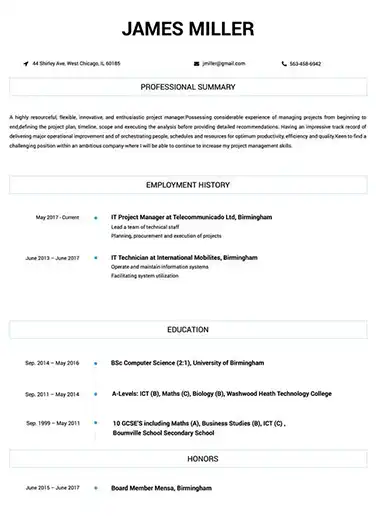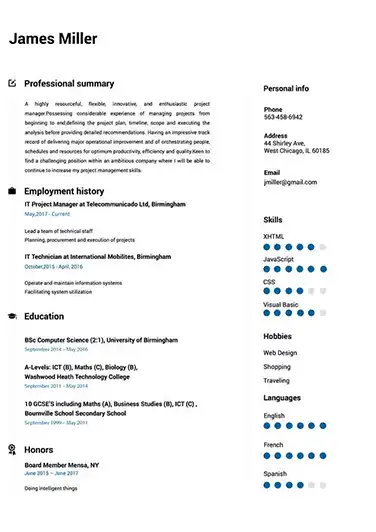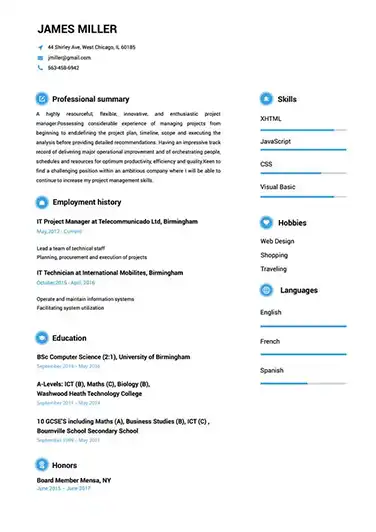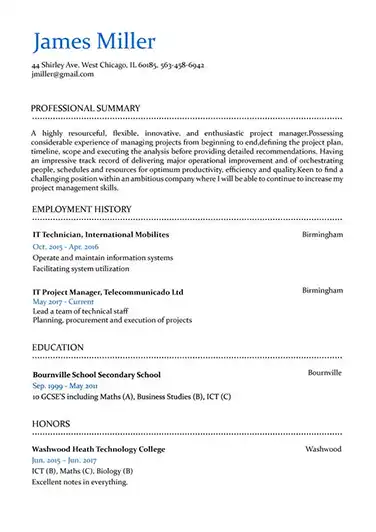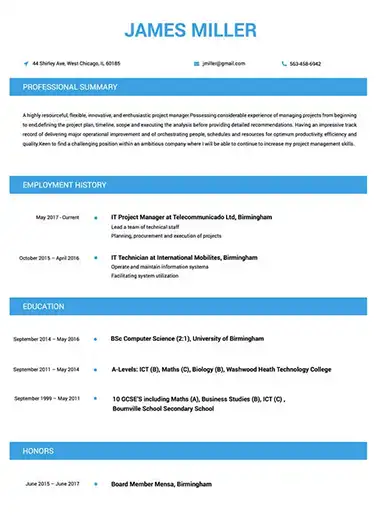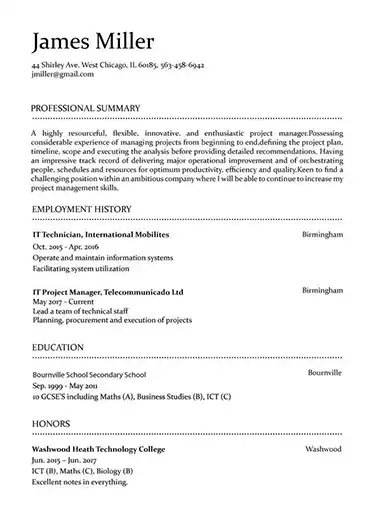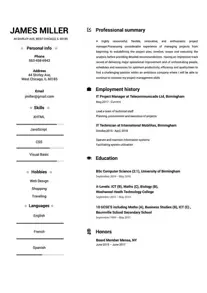 Use This Template
Use This Template
Build your resume in 15 minutes
Create an awesome resume that meets the expectations of potential employers with our selection of professional, field-tested resume templates.
systems engineer: Resume Samples & Writing Guide
jonathanevans@yandex.com
861-044-2749
Employment history
- Implement new IT systems and technologies
- Monitor system performance and security
- Monitor system logs and analyze system data
- Develop and implement system backup and recovery plans
- Troubleshoot and resolve technical issues
- Provide technical support to users
- Collaborate with other IT teams and departments
- Provide technical support to users
- Troubleshoot and resolve technical issues
Education
Skills
Do you already have a resume? Use our PDF converter and edit your resume.
taylorben26@outlook.com
935-114-8932
Employment history
- Develop and deploy system patching and upgrades
- Develop and maintain system documentation
- Create and maintain user accounts and access privileges
- Manage system performance and capacity planning
- Research and recommend system enhancements
- Ensure compliance with security policies and procedures
- Manage system performance and capacity planning
- Troubleshoot and resolve technical issues
- Create and maintain user accounts and access privileges
Education
Skills
nelsonroy@protonmail.com
959-791-6057
Professional Summary
Employment history
- Ensure compliance with security policies and procedures
- Monitor system performance and security
- Troubleshoot and resolve technical issues
- Research and recommend system enhancements
- Create and maintain user accounts and access privileges
- Develop and deploy system patching and upgrades
- Research and recommend system enhancements
- Provide technical support to users
- Implement new IT systems and technologies
Education
Skills
peters.yolanda@hotmail.com
614-860-6353
Employment history
- Research and recommend system enhancements
- Manage system performance and capacity planning
- Ensure compliance with security policies and procedures
- Develop and implement system backup and recovery plans
- Monitor system performance and security
- Troubleshoot and resolve technical issues
- Ensure compliance with security policies and procedures
- Monitor system performance and security
- Research and recommend system enhancements
Education
Skills
whitevirginia@aol.com
644-821-9127
Employment history
- Create and maintain user accounts and access privileges
- Train users on system usage and troubleshooting
- Design, develop, and maintain IT systems
- Train users on system usage and troubleshooting
- Ensure compliance with security policies and procedures
- Research and recommend system enhancements
- Design, develop, and maintain IT systems
- Create and maintain user accounts and access privileges
- Monitor system performance and security
Education
Skills
Not in love with this template? Browse our full library of resume templates
If you were to try to explain what your job as a systems engineer entails to someone who’s not in your line of work, the task would prove near impossible. Sure, you could try to first explain what systems engineering is and then list the range of duties you’re responsible for. However, chances are that the average person simply isn’t going to fully grasp what you do. After all, systems engineering and, in turn, the occupation of a systems engineer involve high-level skills, knowledge, and understandings that are unique to the industry.
Boston University’s College of Engineering explains that systems engineering “Enables building, analyzing and managing a system—be it electrical, mechanical, chemical, biological or one involving business processes and logistics.”
The College of Engineering highlights that while engineering disciplines are traditionally defined through physical attributes, systems engineering goes beyond the physical nature of what is designed or managed, “If ‘it’ consists of multiple interacting components performing a function that cannot be achieved by any one component alone, then ‘it’ is a system, and systems engineers can work to understand and improve it.”
While that likely makes perfect sense to you, take our word that the work you do is incredibly complex for the rest of us to understand! Therein lies your strength as a systems engineer – you can attend to typical responsibilities associated with your profession without blinking an eye. Whether you need to manage and monitor installed systems and infrastructure, or maintain security, backup, and redundancy strategies, you’re able to leverage your niche skill set, as well as your experiences, to effectively complete each task.
So how do you show recruiters that you can indeed do all that is required of you, and then some? Craft a pristine systems engineer resume that communicates what a valuable systems engineer you are. If you’re hazy about how to go about this, read our guide below. By reading it, you’ll gain a range of expert insights including:
- How an ideal systems engineer resume looks like
- What the ATS is and how to create an ATS-friendly resume
- Which qualifications you’ll need to feature
- How to write a fantastic resume objective or summary
- A quicker method for making a winning resume
1. Multiple Template Examples
2. How to Write a Systems Engineer Resume That Will Get You Through the Door
How to format your resume
In order to make a splash with recruiters, you’ll need to submit a well-formatted resume. If you’re wondering what exactly a well-formatted resume looks like, some fundamental characteristics include being logically-organized, sharp-looking, and uncluttered.
The resume format that offers all of these characteristics is a reverse-chronological format. It’s highly-regarded by most recruiters because it makes candidates’ resumes easier to read.
To get into the nitty gritty, a reverse-chronological format structures your resume in a way which particularly emphasises your professional experiences, as opposed to your skills. It arranges each of your work experiences from most recent to least recent. This all makes sense to do once you consider that recruiters generally spend the most time looking at your “Employment History” section.
You won’t only need to be mindful of selecting the right format. You’ll also need to ensure your resume reflects generally accepted layout guidelines. For your convenience, we’ve listed the most critical ones below:
- Number of Pages: One only.
- Fonts to Use: Conservative fonts that you would feel comfortable using to write a report for your boss. For example, Cambria and Time Times Roman.
- Fonts to Avoid: Clunky or attention-seeking fonts that are difficult to read. For example, Guinevere Caps and Monotype Corsiva.
- Margins: 1 inch on all sides.
- Line Spacing: 1 or 1.15.
- Header size: 14-16 point size.
- Text size: 11-12 point size.
What makes a great systems engineer resume?
Modern enterprises need systems powered by backups and safety systems to run smoothly. However, there’s one major challenge: these are not fool-proof. Managing these complex systems is difficult since they could fail at any given moment. It’s the job of a great system engineer to prevent catastrophes before they happen.
For that reason, when business managers are looking to hire a system engineer, they’re looking for the best of the best. The perfect candidate for the role must have a wealth of experience and also need an ideal mixture of skills to do the job effectively.
Recruiters will be searching for a candidate with an in-depth technical understanding of engineering. That’s the foundation. Building on that, the ideal candidate will understand the complexities of the system and gather information to improve it.
Whether you’re an entry-level candidate or a seasoned professional, you’ll need to demonstrate how you tick the above boxes. That means making your resume simple and legible while also including skills and experience to support your claims.
Pro tip: While a system engineer predominantly works with processes, they need to function well as part of a team. Humanize your resume by including information about your interpersonal skills. We’ll show you how to do this further below.
How do you get your resume past ATS?
There’s a gatekeeper standing between you and that all-important job interview. An Applicant Tracking System (ATS) is a form of software that screens your resume before a recruiter looks at it. The software searches for keywords to ensure that your systems engineer resume fits the bill.
Want to play in the big leagues? Believe it or not, 98% of Fortune 500 companies use ATS when vetting candidates. With this in mind, you need to tailor your resume accordingly.
When selecting the right keywords for your resume, they should match the original job advertisement. Essentially, you can pull the words that the recruiter used and edit your existing resume to fit accordingly.The smartest approach is to choose your resume keywords based on the job posting.
It’s important to use exact terminology here as you don’t have much wiggle room. While some ATS software can handle synonyms, others will be looking for specific words. In the latter case, it’s your job to match your resume wording to the advert exactly.
Pro tip: List the programming languages you’ve mastered very clearly, should the job advertisement mention them as necessary.
How do you give recruiters what they’re looking for?
Looking to dazzle recruiters with your system engineer resume? You need to get inside their head and understand what they’re looking for.
It’s no secret that recruiters don’t spend long scanning each application. You’ve got an average of six seconds to impress them. Use that time wisely.
Keep in mind that the recruiter may not fully understand the role of a system engineer. Your job is highly technical, so not everyone is highly-familiar with it. With that in mind, pepper your resume with buzzwords and phrases that the recruiter will know and understand.
Similarly, you should avoid jargon and technical language. The golden rule is: if you can simplify a sentence, do so. The recruiter doesn’t have time to read reams and reams of text. They want to know if you match the criteria and whether you can support that.
Pro tip: Show, don’t tell! It’s one thing to say that you have the right skills and experience, but can you prove it? Provide extra information evidencing your claims.
What are ideal system engineer job qualifications to have? How do you list them correctly?
System engineer roles are entirely dependent on qualifications. Recruiters need to see that you have a strong technical ability. The best way to prove this is with a relevant educational background and certifications.
Education
In terms of ideal system engineer job qualifications, as a baseline, you’ll need a Bachelor’s and Master’s Degree in Systems Engineering or related subjects, such as Computer Information Systems or Systems Information Management. To feature your educational background correctly, include the following information about each degree in your resume’s “Education” section:
- The name of the degree
- The name of the college you attended
- State the college is located in
- The years you studied
For example:
EDUCATION
- Master of Science in Systems Engineering, New York University, NY, 2017 - 2020
- Bachelor of Science Program in Industrial and Systems Engineering, Binghamton University, NY, 2012 - 2016
Pro tip: Are you an entry level candidate who put your nose to the grindstone to score a GPA of 3.5 or above? Shine a light on this amazing achievement by including it as a bullet point below the standard information we’ve included above. Another option is to make mention of it in your resume objective.
CERTIFICATIONS
Your college degrees represent a key part of your qualifications as a systems engineer. But your education is unlikely to end there. Throughout their career, a great systems engineer continually learns and sharpens their skills by undertaking relevant training and certifications. For example, it may be beneficial to have the following certifications:
- INCOSE Systems Engineer Certification
- JavaScript Expert Level Certification
- C# Expert Level Certification
- PHP Expert Level Certification
- Python Expert Level Certification
So how do you list any relevant training and certifications you have to your name? The simplest answer is to create a “Training and Certifications” section in your resume. You don’t need to write a description about each one;you just need to include the following information:
- The name of the certification
- The institution you received it
- The state the institution is located in
- The year you received the certification
For example:
- Expert Systems Engineering Professional (ESEP) Certification, International Council on Systems Engineering (ICOSE), NY, 2020
Pro tip: Prioritize this bullet-pointed section by putting the most relevant system engineer certifications you hold towards the top.
How to highlight your most important achievements
Want to shout about the milestones that you achieved in your previous roles? Whether you won a specific award or reached a target in your last job, you’ll want to let recruiters know. But before you get started, it’s important to recognize that where and how you highlight these achievements will depend on a few factors.
So where should you include them? Beneath each role you list in “Employment History,” use a few bullet points to describe the role and the duties you performed, making sure to emphasize your key achievements for each.
But don’t make the mistake of being too vague! When writing this section, we recommend that you provide both your achievement and specific facts that back it up. Let’s take a look at an example of how not to highlight one of your system engineer achievements:
- Collected system data for purposes of analyzing it and making improvements.
At a glance, you might think that the above achievement is fine. It outlines the candidate’s duty and explains the reasoning underpinning it. However, there’s one glaring error here. The candidate hasn’t quantified the experience or supported their claim.
A recruiter would take a look at this part of the resume and have a few questions. How often did the candidate collect system data? How was this data shared with the management team? How many times did they complete this task in their role?
Since the last thing you want to do is baffle a recruiter, you’ll need to be more specific. Let’s take a look at a better example of the same system engineer achievement:
- Collected and analyzed system data and created 25+ charts and reports, which were shared with management for analytical purposes.
In this above example, the candidate has given the recruiter a more detailed account of their achievement. The fact that the candidate has produced more than 25 charts and reports shows that they’re proficient in this area. If the current role requires this skill, the recruiter can rest assured that the candidate will take to it like a duck to water.
Which soft and hard skills should you mention? How do you do so correctly?
Arguably, your resume’s “Skills” section is one of the most important parts of your system engineer resume. You should use it to showcase the skills and traits you’ve learned through both your education and professional experiences.
Before you dive in and start listing your countless skills, take a moment to strategize. Choosing the right skills for your system engineer application is the key to your success. Begin by looking at the phrases used in the job ad that indicate the skills a recruiter is after. Next, work out which ones genuinely match up with your own skills set. Then, customize your skills section accordingly. You should select 6 to 8 of the skills from the job ad to add to this section.
You’ll also need to incorporate these skills in addition to the other skills you identify in a job ad throughout your “Employment History” section. One final section you should add a few to is your “Resume Objective” or “Resume Summary.”
When you’re adding skills to your resume it’s important to keep in mind that while a system engineer role is a technical position, you shouldn’t neglect your soft skills. The perfect candidate will be able to handle the technical side of the role while demonstrating their soft skills like communicating fluidly with the rest of the team and management.
Looking for some inspiration? Here are the most crucial soft and hard skills recruiter for system engineer roles may be looking for:
Hard skills
- Servers
- JavaScript, C#, Python, or PHP
- Software development
- Agile Methodologies
- Unix
- Database management
- MS SQL
- Enterprise architecture
Soft skills
- Highly disciplined
- Organized
- Trustworthy
- Excellent communication
- Team work
- Troubleshooting
- Adaptable
- Continuously learning
How to write a resume objective or summary and examples of both
If you had a couple of seconds to tell the recruiter why you’re the right candidate, what would you say? Essentially, this is what your resume objective or resume summary is.
If you’ve been working as a system engineer for years, write a summary of your experience and skills. On the other hand, if you’re a recent graduate with no experience in the sector, write an objective instead.
Resume objective
Before we delve into how to perfect your objective, here’s an example of what not to write:
- Recent graduate holding a Master’s Degree in System Engineering seeks a full-time role in the sector. Willing to learn skills on the job. Current skills include data management, data analytics, and software development.
While the above system engineer objective includes some vital information, it’s still lacking. Terms such as ‘data management’ and ‘software development’ are redundant if you can’t explain what systems you use. Equally, stating that you’re ‘willing to learn new skills’ means nothing to a recruiter. They want to know what skills you currently have.
Here’s an example of what the same candidate could have written instead:
- Ambitious graduate holding a Master’s Degree in System Engineering. Current skills include utilizing relational databases including MS SQL for management and analytic purposes. Holds expert level PHP and C# for software development.
This objective is ten times more effective than the previous example. The candidate doesn’t waste words explaining that they want to learn new skills. Instead, they focus on the skills that they currently have and elaborate on them. Mentioning the languages and software systems they are proficient in is also a sure-fire way to grab a recruiter’s attention.
Resume summary
If you’re a seasoned pro in the system engineer field, you should write a resume summary. This paragraph encapsulates what it is you have to offer and why a recruiter should hire you. You should include information about your past experiences and the skills you’ve honed. You should also include some key achievements if you can squeeze them in.
To give you some idea of what to avoid, let’s first look at a bad example of a summary:
- Experienced system engineer proficient in PHP, Python, and C# looking for the next challenge. Previous experience working within a large company, managing complex systems, and supplying data analytics.
This example of a resume summary hits many of the main targets. It highlights the languages that the candidate uses and details the size of the company. However, the candidate wastes space saying they’re “looking for their next challenge”. What’s more, the resume summary lacks some detail when it comes to the type of company and its scope.
The same candidate would wow a recruiter by writing the following resume summary:
- System engineer with 5+ years experience working within a 300+ staff governmental department. Proficient in PHP, Python, and C# for software development. Talents include creating analytical charts and reports detailing data. Excellent teamwork and communication skills.
Can you spot the difference between this example and the previous one? In this example, the candidate is much clearer about their experience. They’ve mentioned both the size and type of company where they previously worked. Moreover, they’ve detailed how they supply data analytics, which means the recruiter has an idea of what they can expect. As the cherry on top, this candidate has alluded to their teamwork and communication skills.
How do you target your resume for each application?
Think you can use one system engineer resume for every application? Think again. If you want to give yourself the best chance of success, you need to tailor your resume well.
Luckily, doing so is simple. Read the original job posting closely and highlight the keywords you find throughout it. In case you need a bit of a refresher, adding keywords to your resume allows you to match your resume to a recruiter’s requirements for a given role. For example, if you see that a recruiter requires candidates to use a certain programming language or technical system, make sure to feature it at least once in your resume in a meaningful way.
When you’ve reviewed the posting, you’ll have a list of keywords. Compare this list to your existing resume. How much overlap is there? You can now edit your resume to match the original job posting as closely as possible. Ensure that all of the job requirements are listed within your skills, work experience, and any other sections as appropriate.
Finally, you need to edit, edit, and edit some more! Without a doubt, there will be skills or words that you can lose. While you may find it hard to keep things concise, doing so is paramount. The quicker and easier you make the recruiter’s job, the better.
How do you make your resume stand out?
Making an impact with your resume doesn’t necessarily require you to do anything dramatic. You just need to have a few simple but powerful insider tips up your sleeve. Here are a few we advise you to put into action if you want your resume to stand out from the competition:
- Be mindful of the “above the fold” rule of thumb: There’s a rule of thumb that will help you to ensure your resume is optimally formatted. It’s called the “above the fold” rule and entails putting the most eye-catching and relevant information first and foremost in your resume.
Remember, recruiters will generally read your resume from top to bottom. Consequently, if some of your most attractive achievements and qualities are hidden deep in your resume, there’s a good chance they won’t get noticed. While it’s not possible in every situation, try your best to position the information you want recruiters to pay attention to as close to the top of your resume.
- Don’t try to ‘wing’ it: We’ve all heard stories of people who manage to score a top job without having worked on their resume. It may even make you tempted to think you’ll be able to do the same. While these stories do exist, they’re incredibly rare. It’s also highly likely that a lot more was involved in the process than the candidate simply winging it.
The fact of the matter is that if you want to be hired for a top job, you’ll need to put the effort into getting it. That means customizing your resume each and every time and not trying to get away with handing in the same resume. If you’re after an insider tip for making your resume more efficiently, be sure to check out our final section of this guide below.
- Know what to leave off: Knowing what to omit from your resume is just as important as knowing what to include. The reason being that leaving off information that recruiters view as redundant will not only free up more space for you to focus on more important matters, but also help your resume come together more cohesively.
So what information is worth leaving off? Many recruiters suggest leaving off your references as recruiters will ask you for them anyway if you make it into the final stages of the hiring process. It’s also considered standard to omit any personal details from your resume such as your appearance, marital status, age, and whether or not you have children. Finally, your desired salary definitely has no place on your resume.
3. How System Engineers Can Save Time Making Their Resume Using Resumebuild.com’s Resume Builder Tool
As we’ve explored extensively in our guide above, making your resume just right is integral to your success as a systems engineer. The resume will be your ticket to your next job, be it one you’re actively looking for or get head hunted to apply for.
By now, you should have a solid idea of the amount of work you’ll need to put into making it. Of course, it’s easy enough to make an OK one, but just don’t expect to get hired any time soon! Making a resume that not only gets the tick of approval from recruiters, but also passes ATS is seriously hard work.
It’s these considerations that got us thinking at Resumebuild.com, “There has to be another way.” Fortunately, we found it – or rather, designed it! So what is it we designed exactly? A world-class resume builder that helps job seekers to piece together an impressive resume in minutes instead of hours.
It does much of the heavy lifting you’d usually need to do all by yourself. From guiding you to write each major section of your resume, to organizing the layout and formatting of your resume with our stunning resume templates, you’ll soon come to consider our resume marker as your secret weapon to scoring your dream job.
So if you’re after an incredibly easy, quick, and affordable way to create a systems engineer resume that showcases why you’re the perfect hire, start crafting your resume with our resume builder.
systems engineer Job Descriptions; Explained
If you're applying for an systems engineer position, it's important to tailor your resume to the specific job requirements in order to differentiate yourself from other candidates. Including accurate and relevant information that directly aligns with the job description can greatly increase your chances of securing an interview with potential employers.
When crafting your resume, be sure to use action verbs and a clear, concise format to highlight your relevant skills and experience. Remember, the job description is your first opportunity to make an impression on recruiters, so pay close attention to the details and make sure you're presenting yourself in the best possible light.
systems engineer
- Field Enrichment
- Text Extraction
- Data Ingestion
- Deploying and supporting vRealize Operations Manager and Log Insight based enterprise monitoring solutions for Infrastructure Monitoring and Capacity Planning.
systems engineer
- Analyzed throughput graphs, hits/second graphs, transactions per second graphs and rendezvous graphs using LoadRunner Analysis tool.
- Responsible for developing and modifying automated test scripts using Load Runner.
- Created correlation as well as parameterization using Load Runner VuGen.
- Executed scenarios using performance center and analyzed the results using Load Runner Analysis.
- Conducted performance testing using Load Runner for the entire applications using various scenarios specifically that are designed for testing real world scenarios.
- Developed scripts and scenarios for automated testing new and enhanced web based products using Load Runner.
systems engineer
- Worked on SAP Vistex IP Module and SAP SD AMS support.
- Provide functional guidance and support to users and L2 support team.
- Functional Unit testing.
- Change requests management and AMS support.
systems engineer
- Understanding and analyzing the data with the Client.
- Developing graphs, charts and data models on the basis of historical data and their presentation.
- Provide training, documentation and other assistance to consulting staff to support and expand the use of data integration and advanced analytics.
- Research and Development in different PAIN areas of clients as well as for units within Infosys.
systems engineer
- Disk Management: Volumegroup, physicalvolume,logicalvolume create and administrating.
- Extending the filesystem as per the request from end user.
- ApplyingOperating system updates, patches and changes in services.
- Automating the task by scheduling the cron jobs. Booting
- Trouble shoot and passing runtime parameters
systems engineer Job Skills
For an systems engineer position, your job skills are a key factor in demonstrating your value to the company and showing recruiters that you're the ight fit for the role. It's important to be specific when highlighting your skills and ensure that they are directly aligned with the job requirements, as this can greatly improve your chances of being hired. By showcasing your relevant skills and experience, you can make a compelling case for why you're the best candidate for the job.
How to include technical skills in your resume:
Technical skills are a set of specialized abilities and knowledge required to perform a particular job
effectively. Some examples of technical skills are data analysis, project management, software proficiency,
and programming languages, to name a few.
Add the technical skills that will get hired in your career
field with our simple-to-use resume builder. Select your desired resume template, once you reach the skills
section of the builder, manually write in the skill or simply click on "Add more skills". This will
automatically generate the best skills for your career field, choose your skill level, and hit "Save &
Next."
- Cloud Computing
- Networking
- Cybersecurity
- Linux
- Coding
- Operating Systems
- Virtualization
- Firewalls
- Cloud Security
- Scripting
- System Administration
- Troubleshooting
- Automation
- Disaster Recovery
- Software Development
- Data Center Management
- Network Security
- Network Administration
- Cloud Infrastructure
- DevOps.
How to include soft skills in your resume:
Soft skills are non-technical skills that relate to how you work and that can be used in any job. Including
soft skills such as time management, creative thinking, teamwork, and conflict resolution demonstrate your
problem-solving abilities and show that you navigate challenges and changes in the workplace
efficiently.
Add competitive soft skills to make your resume stand-out to recruiters! Simply select
your preferred resume template in the skills section, enter the skills manually or use the "Add more skills"
option. Our resume builder will generate the most relevant soft skills for your career path. Choose your
proficiency level for each skill, and then click "Save & Next" to proceed to the next section.
- Communication
- Interpersonal
- Leadership
- Time Management
- Problem Solving
- Decision Making
- Critical Thinking
- Creativity
- Adaptability
- Teamwork
- Organization
- Planning
- Public Speaking
- Negotiation
- Conflict Resolution
- Research
- Analytical
- Attention to Detail
- Self-Motivation
- Stress Management
- Collaboration
- Coaching
- Mentoring
- Listening
- Networking
- Strategic Thinking
- Negotiation
- Emotional Intelligence
- Adaptability
- Flexibility
- Reliability
- Professionalism
- Computer Literacy
- Technical
- Data Analysis
- Project Management
- Customer Service
- Presentation
- Written Communication
- Social Media
- Troubleshooting
- Quality Assurance
- Collaboration
- Supervisory
- Risk Management
- Database Management
- Training
- Innovation
- Documentation
- Accounting
- Financial Management
- Visualization
- Reporting
- Business Acumen
- Process Improvement
- Documentation
- Relationship Management.
How to Improve Your systems engineer Resume
Navigating resume pitfalls can mean the difference between landing an interview or not. Missing job descriptions or unexplained work history gaps can cause recruiters to hesitate. Let's not even talk about the impact of bad grammar, and forgetting your contact info could leave your potential employer hanging. Aim to be comprehensive, concise, and accurate.
Employment history
- Develp annd maintian systtem doccumentation.
- Train users on system usuage and troublshooting.
- Manege systme performence an capacity plannin.
- Colaborate wih othr IT teems an deparments.
- Develp and implemet system back-up and recvery plans.
- Deveop and maintin system documenttion.
- Manege systme performnce an capicity plannin.
- Troubleeshoot and resolv technicall issuess.
- MOnitor system logs anD analyzE system datA.
Education
Skills
Avoid Spelling Mistakes and Include your Contact Information
Missing contact information prevents recruiters from understanding you're the best fit for the position.
Key Insights- Make sure you're not missing contact information on your resume. That should include your full name, telephone number and email address.
- Make sure to use a professional email address as part of your contact information.
- Highlight your contact information and double check that everything is accurate to help recruiters get in touch with you.
How to Optimize Your systems engineer Resume
Keep an eye out for these resume traps. Neglecting to detail your job roles or explain gaps in your career can lead to unnecessary doubts. Grammar blunders can reflect negatively on you, and without contact information, how can employers reach you? Be meticulous and complete.
kevinhawkins@hotmail.com
810-557-4434
Employment history
- Create and maintain user accounts and access privileges
- Collaborate with other IT teams and departments
- Develop and deploy system patching and upgrades
- Develop and deploy system patching and upgrades
- Monitor system performance and security
- Develop and maintain system documentation
Education
Skills
Unexplained Year Gaps and Missing Job Experiences are a No-no
Gaps in your resume can prevent recruiters from hiring you if you don't explain them.
Key Insights- It's okay to have gaps in your work experience but always offer a valid explanation instead of just hiding it.
- Use the gap to talk about positive attributes or additional skills you've learned.
- Be honest and straightforward about the gap and explain it using a professional summary.
systems engineer Cover Letter Example
A cover letter can be a valuable addition to your job application when applying for an systems engineer position. Cover letters provide a concise summary of your qualifications, skills, and experience, also it also gives you an opportunity to explain why you're the best fit for the job. Crafting a cover letter that showcases your relevant experience and enthusiasm for the Accounts Payable role can significantly improve your chances of securing an interview.
Evans jonathanevans@yandex.com
861-044-2749
974 Riverbend Road, Toughkenamon, PA
19374
Accenture
New York, New York
Esteemed Recruitment Team
I am a highly motivated Systems Engineer with 5 years of experience in Information Technology (It). I am excited to submit my application for the Chief Systems Engineer position at Accenture, where I believe my skills and expertise would be an excellent fit.
My life experiences have taught me the importance of hard work, dedication, and collaboration. Whether it was on the work, or just personally, I have always been committed to pursuing my goals with passion and tenacity. I am confident that throughout all of these years I have gained the skills and expertise necessary to succeed in this role and be a great asset for Accenture. I am eager to join a team that shares my values and work towards a common goal.
I appreciate the time and consideration you have given my application. I am confident that if we work together we could achieve great things and so I look forward to the opportunity to join your team.
Kind regards,
Jonathan Evans
861-044-2749
jonathanevans@yandex.com
Jonathan Evans
Showcase your most significant accomplishments and qualifications with this cover
letter.
Personalize this cover letter in just few minutes with our user-friendly tool!
Related Resumes & Cover Letters

Build your Resume in 15 minutes
Create an awesome resume that meets the expectations of potential employers with our selection of professional, field-tested resume templates.

